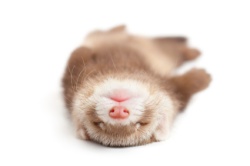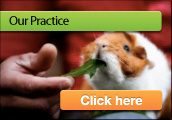Ferrets

The ferret is descended from the wild European polecat but many generations of breeding in a domestic environment has made the ferret into a very intelligent and rewarding pet that will provide hours and hours of fun. They come in a variety of colours from pure white (albino) to polecat. Like all animals they will develop trust in their owners if handled in a friendly and sympathetic way and are given clean and comfortable living quarters together with a suitable diet. They are not vicious animals but must be handled carefully and there are times (particularly during the breeding season) when ferrets like some privacy.
Regular handling from an early age establishes confidence and ferrets will learn very quickly. They can even be trained to walk on a lead and will live to about 10 years of age.
Like all intelligent furry animals they should not be spoilt and children should not be encouraged to let their ferrets roam unattended in the house. Ferrets are experts at hiding away in a dark corner or finding interesting areas to explore. Their sharp claws will quickly take them up the curtains and there is nothing a young ferret enjoys more than playing hide and seek. Being very small they can easily disappear for hours into a bed or down the back of a sofa.
Ferrets do have a distinctive odour and the male of the species in particular. However, clean bedding at all times and attention to hygiene will greatly reduce any unpleasant smell.
Their cage should be stoutly built about 4 feet by 2 feet, a depth of 2 feet and have a private nesting/sleeping area out of view. It should have a roof that is waterproof and legs to keep it about 3 feet off the ground. It should be in a sheltered spot. A nesting area is particularly important for any breeding ferret as they are very sensitive to having their young disturbed at an early age. Ferrets will be healthier if kept outside with plenty of fresh air and with warm bedding will be happy during the winter months. Like any other animal they hate damp conditions but as they are particularly susceptible to heat stroke you should take care to position the cage out of the midday sun during summer.
Ferrets are very active and need lots of exercise and stimuli. They like to be on the move, are very inquisitive and of course their natural instinct is to hunt and "ferret about". Always provide objects for ferrets to play with such as wide tubes, boxes and cat toys. If you are not prepared to spend time and take a great interest, ferrets are not for you! The time spent is amply rewarded as ferrets are affectionate, sociable, clever and fun. Lack of exercise and being confined to a small space for long periods of time is probably the cause of bad temper, nervousness and the reason why a ferret might not be averse to the odd painful bite. They are intelligent animals who do not like being neglected. With the right introduction they will happily interact with other family pets such as cats and dogs (but not rabbits or other small furry pets)
Ferrets are natural carnivores and there is nothing they love better than to get their face embedded in a piece of raw meat. Tinned specialist pet foods are fine and also cereal biscuits help to keep their teeth and gums healthy. Plenty of fresh clean water should be available at all times. A simple diet and regular meal times with plenty of exercise forms the basis of good health.
Female ferrets (or Jills) are peculiar in that they produce so much female hormone (oestrogen) when they come in season that it harms their own bone marrow. They are usually OK the first year but the second year many of them develop serious, frequently fatal, anaemia. You can prevent this by either speying or getting them injected with a contraceptive every Spring. Speying is easy and safe and can be done from 4 months of age. The contraceptive injection would normally be given every March and is very effective. If you wish to breed then best to do so in the first few years.
Male ferrets can be easily neutered - it reduces their body odour but doesn’t eliminate it. It makes them a bit more sociable and a bit easier to handle.
Popular Names - Just for Fun!
The most popular ferret name is ’Bandit’ closely followed by ‘Gizmo’ and ‘Rascal’. We also see a few flowers with ‘Daisy’, ‘Flower’ and ‘Buttercup’ being popular choices.




